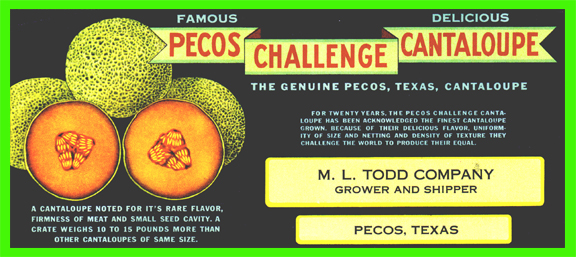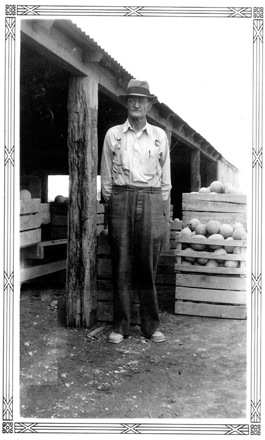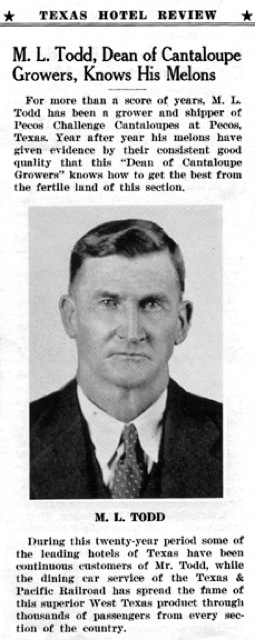The Origins of the Pecos Cantaloupe Industry
Longtime residents of Pecos, Texas will associate the title of “Mr. Pecos Cantaloupe” with my maternal grandfather, M. L. Todd. A state historical marker at the West of the Pecos Museum recognizes him as the “father of the Pecos cantaloupe industry.” Granddad Madison died in 1967 at age 92, Grandmother Julia in 1969 at age 89. They are buried in the Evergreen cemetery west of Pecos.
My parents, Neil and Zorene Thompson, were associated with the M.L. Todd's in the cantaloupe business beginning in 1938. My Sister Barbara and I grew up on our farm west of Pecos, and with the family cantaloupe business. We both graduated from Pecos High School and lived in Pecos until after college graduation. Mother and Dad lived on the farm until 1948, but finally moved into town. They stayed in the cantaloupe business until 1955, when they sold their interests to Marcus Dingler and Bob Dean. Daddy died in 1962. Mother remained active and interested in Pecos affairs, including the continued growth and change in the Pecos cantaloupe industry. She moved to Carlsbad, New Mexico in 1978, to be near Barbara and her family, Mr. and Mrs. John W. Coleman. Mother continued to lead an active life for a number of years, living in her own apartment. During this time she wrote a part of our family‘s history, which is now a treasured family keepsake. -[1] -Mother died in 1994, at the age of 93.
In 1987, the Pecos Chamber of Commerce sent Mother an invitation to attend the “Fourth-Annual Pecos Cantaloupe Festival” held each August. The invitation included a request for pictures of Grandmother and Granddad Todd, and information about the early days of the Pecos cantaloupe industry. Mother was very pleased at the special invitation, and Barbara and I and our families made plans to accompany her to the festival. Mother worked for many years to support and improve the Pecos Museum and to secure the state historical marker honoring her parents. At the time the marker was dedicated in 1970, our family presented the museum with photographs of Granddad and Grandmother Todd—“Madison and Julia” to their family and close friends. We made arrangements with the museum for these pictures to be used as part of the festival display at the Pecos Rodeo Grounds.
Mother has always been the one to save and document our family history, but for this occasion she turned her files over to me and asked if I would write an article for the festival. This I have done, drawing my information from Mother's files, and from my own recollections. -[2] -
Many people have contributed to the growth and success of the Pecos cantaloupe industry...Granddad Todd himself lived to see many new players and radical changes in the business, and Mother and Dad many more. So, it was a great treat for our family to visit Pecos again in August of 1987, and to catch up on the changes in the people and processes in the industry. However, the following is about the beginnings of the industry, and about the part my family played in building it. I hoped it would be of interest to the festival, and to some of the younger generation in our own family.


From one of Mother's few advertising ventures. This $10 ad ran in the August 1939 issue of Texas Hotel Review. Grandad had only one look for photographs... this was it!
“Mr. Pecos Cantaloupe”
He is acknowledged as the father of the industry: “Mr. Pecos Cantaloupe,” M.L. Todd. His full name was Madison Lafayette Todd, but I never heard anyone address him on the street as anything other than “Mr. Todd.” Madison Todd was born in 1875 in Gladewater (Upshur County), Texas. He was married in 1899 to Julia Mackey in the small east Texas farming community of West Mountain, Texas, near where both their parents were born. They lived there until 1908, when they moved west to the New Mexico Territory. This move was dictated by the fact that, even as a young bridegroom, Madison had tuberculosis. His doctors thought he had only a short time to live, but that his life would be prolonged if he moved to a drier climate.
Tuberculosis was such a pernicious disease in those days that Grandmother's father never expected to see his son-in-law alive again, and offered this somber admonition to his daughter as he kissed her goodbye: "Now Julia, when Madison dies, we want you to bring him back here for burial.” What a sad farewell... perhaps it made Grandmother determined to help him get well. And she did, working by his side in the fields, seeing that he got extra care and nourishment, and rest when possible. From the earliest days of their marriage until her death, Grandmother's life was centered around taking care of Madison and her children. The fact that Granddad lived to the age of 92 years can be attributed as much to Julia's prayers and care as to the doctors of the day and the hot climate of New Mexico. That is to say, there might not have been a “Mr. Pecos Cantaloupe” without Grandmother!
New Mexico was still a territory in 1908, and Granddad Todd had filed on a 160-acre homestead near the small community of Ricardo, New Mexico (about 14 miles northwest of Ft. Sumner). Granddad moved himself and all of their household goods, provisions, and livestock in an “emigrant car” on the Texas & Pacific and Santa Fe Railroads. Granddad rode in one end of the car, in order to take care of his livestock quartered in the other end. Grandmother and the children followed by passenger car a few weeks later. For the first six months they lived in tents, while their four-room house was being built with the help of neighbors, because Granddad was so weakened by TB. Life on their homestead was hard, frustrating, and financially unprofitable for Madison and Julia. However, Mother recalls that these were busy and happy years for her and her brother, Judson.
In the fall of 1916, Granddad Todd decided that he should move to where his children could get a better education. He told his children, “An education can never be taken from you, and that is what I want most to give you.” He traded his New Mexico homestead to a young man whose uncle was farming in Pecos, Texas. In the trade, Granddad received an undivided interest in a 160 acre farm located four and one-half miles northwest of Pecos. The farm was irrigated with water pumped from a deep well instead of the more common artesian water source. At Christmas time, the Todd family moved back to Texas.
Building a Reputation
In Pecos, Granddad and the uncle of the young man who had purchased his New Mexico homestead, Mr. D.T. McKee, became business partners. At this time in Pecos, small acreages of cantaloupes were already being grown and sold locally. Mr. McKee knew that there was something special about cantaloupes grown in Pecos soil, under irrigation. He was perhaps the first to see the possibilities of selling them to out of town customers. Their first “commercial” customer was the Dining Car Service of the Texas and Pacific Railway Company. (Little did they know that the growth of the Pecos cantaloupe industry would be entirely dependent on the railroad and the Railway Express Company.) Their T&P customer proved to be a special blessing, and was critical to the start and direction of the fledgling Pecos cantaloupe industry. However within two years, family obligations caused Mr. McKee to sell his interest to Granddad Todd and return to his former home in Virginia. Granddad continued with the business, shipping to a few more customers each year.
Patrons in the T&P Dining Cars were impressed with the look, texture, and taste of the breakfast cantaloupe they were served, and some asked where they were grown. The T&P graciously provided them with Granddad's address, and some began to send in orders. Granddad saw a new way to make his business grow: specializing in shipments of Pecos melons to individuals. Shipments were made directly to their homes by Railway Express. As these shipments continued through the twenties, the word about "Pecos Cantaloupes" began to spread and the small industry grew. More acres were planted, and other growers joined the business.
Granddad Todd was very particular about shipping only the very best melons. The field melons were not only graded very closely for quality and appearance, but by ripeness. It is a tribute to the Railway Express service of days gone by that, by selecting melons with proper ripeness, it was possible to ship them in open slatted crates to any state in the US and have them arrive ready to eat. The tricky part was knowing what day to ship the melons, so that they didn't remain in the local Express Office over the weekend! Letters of appreciation and re-orders for the melons far outweighed complaints. Any complaints received were handled with a new prepaid shipment, no questions asked.
The reputation of Pecos melons continued to grow, almost entirely by word of mouth; no advertising was done for many years. People not only heard about Pecos Cantaloupes, but about “Mr. Todd, the Cantaloupe King;” mail often found its way to Granddad's post office box with no other address than this…
Modernization Arrives
In 1938, my family moved to Pecos from Lubbock, Texas to begin farming with Grandmother and Granddad Todd. My dad, Neil, was a master mechanic and Granddad needed his farming operations modernized and mechanized. My mother, Zorene, was an experienced secretary, and the growing cantaloupe business needed her services as well. (I still remember seeing Grandmother Todd writing out shipping labels with a fountain pen! Mother taught Barbara and I to type at home, before I entered High School. One of our jobs in Mother’s office was typing shipping labels on an old Underwood typewriter.) While Dad was learning the farming side of things (which included cotton and alfalfa hay), Mother began to put her personal stamp on the business end of things. She began to develop a close personal relationship with our customers that garnered Christmas cards even after she had retired…
From the early days of the T&P Dining Cars, some customers became special friends; many of them ordered year after year. She accepted and encouraged special orders such as this: “Please send a crate of Jumbo's to our home every week, hard ripe. For the last three weeks in August, please send this order to our summer home, Cherry House on the Hudson...etc.” Mother would type a personal letter of acknowledgement, wishing them, “a pleasant summer on the Hudson.” Some would order for their children, and then their children would order, and soon Mother knew the whole family! Incidentally, most of our orders came from out of town by mail, were paid for with personal checks, and very, very few bad checks were received. We had important commercial customers as well, who served our melons in famous and interesting eating places such as: The Fort Worth Club, the Dallas and Lakewood Country Clubs in Dallas, the Racquet Club in St. Louis, and The Colony and 21 Club in New York City.
Dad had a wide-open field to modernize Granddad Todd's farming operations. (I remember when we retired Granddad's two draft horses, Dogie and Blue...) Neil was already a good all-round mechanic, but now taught himself to weld and to run contour lines for better irrigation. Dad designed several special tractor tools for cultivating cotton and melons, adapting them for hydraulic pickup years before they were available from the implement dealers. I believe we installed the first farm butane tank in Reeves County (with a gas Servel refrigerator that everyone came to see!), and bought and used the first pick-up hay bailer in the county.
Zorene got her end of the business running efficiently, just in time to capitalize on a new kind of order that was really beginning to catch on—the “gift shipment.” The idea of sending a special gift of fruit or other delicacy to friends or associates (that you wanted to thank or impress) did not begin with the cantaloupe, but it became a big part of our business. We had cultivated a reputation for high quality melons, reliable shipments, and personal service, and about this time the cantaloupe came into favor as a new and unusual gift fruit. (The fact is, melons often looked rather unappetizing in the crate when they arrived, but because of the special shipping quality of Pecos melons they were a pleasant surprise when put to the taste test!) Many individuals and corporations began to send in lists of names to receive gift shipments. Some of the lists were so long that they required most of the growing season to fill. (I remember typing shipping tags for the gift list of The National Tank Company with 300 names or more, except by this time we had an automated Elliot Address-O-Graph machine!) They usually relied on Mother to decide just when would be the best time to ship to a particular destination, with perhaps a “vacation date” when they should not be shipped, or were to be shipped to a different address—all part of her personal service. If a gift card was supplied, It was my job to tacking it on the crate near the shipping tag. (I remember learning from Granddad Todd how to hold tacks in my mouth, spit them onto a tack hammer, and then zap them into the shipping tag! However, we soon retired Granddad's tack hammer in favor of a rapid fire stapler!)
Many of our customers and their friends that we shipped to were influential leaders in business and government, and Mother took great pride and interest in corresponding with some of the “rich and famous.” Some of our more famous individual customers included: President Lyndon B. Johnson (a regular customer before and after he was President), Miss Helen Keller, Mr. Sid Richardson, Coach Hayden Frye, Dr. G. V. Bridley at Scott and White Hospital, the Honorable James A. Noe - Governor of Louisiana, and many other business executives and political figures.
Once we received this order from the late Dr. G. C. Hall of Big Springs, Texas: “Please ship me the very first crate of Todd's Delicious Cantaloupes each year, to be followed by a crate each week throughout the season, for as long as I live.” Each year, on the day that we had enough of the very best melons to ship to Dr. Hall, we knew that the Pecos cantaloupe season was really underway! Mother says, as far as she knows, this order was filled for many years after she left the order desk...
Passing the Reins
In the early 40’s, Granddad Todd sold his remaining interest in the cantaloupe business to Mother and Dad, but he didn't retire... He continued to check the seeds, check the crop, and check the weather! He wanted to see that only the best melons were packed and shipped; however, he would always be satisfied with a few of the “culls” to “take home to Julia.” He was proud of the Pecos melon industry, but always minimized his contribution. Granddad had a rather stern countenance and was not very much of a conversationalist (Grandmother took care of that end of their marriage!). However, he had a dry sense of humor and often surprised you with his wit when pressed for a response. Once, when asked for his opinion about whether or not Pecos cantaloupes were really any better than those grown elsewhere, with a twinkle in his eye Granddad's reply was, “Well, if they are not, I've got enough people fooled into thinking they are that I can sell all that I grow!” Let's hope that it will ever be so for the Pecos cantaloupe industry!
Ray Mack Thompson
June 13, 1987
Revised August 7, 2001
[1] -“Our Little House on the Prairie”, by Zorene (Todd) Thompson – published by Ray and Barbara Thompson, recounting life on a homestead in New Mexico Territory, 1908-1916.
[2] - In 1990, I received a request for background information on the Pecos cantaloupe industry from a writer for “Texas Highways Magazine.” The above story was used as source material for an excellent piece, published in the July 1991 issue of Texas Highways.
